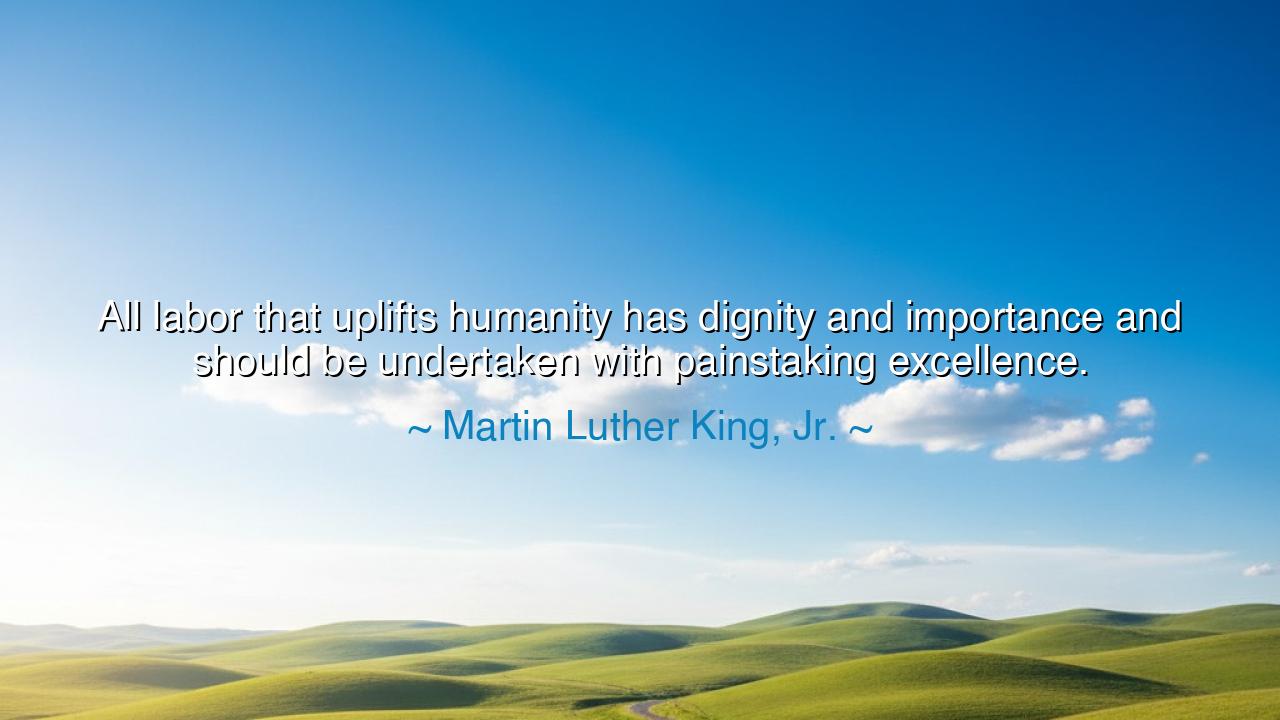
All labor that uplifts humanity has dignity and importance and
All labor that uplifts humanity has dignity and importance and should be undertaken with painstaking excellence.






Hearken, O seekers of virtue and purpose, to the words of Martin Luther King, Jr., whose voice resounded like a clarion call across the valleys of human striving: "All labor that uplifts humanity has dignity and importance and should be undertaken with painstaking excellence." In this utterance lies the ancient truth that the work which serves the collective spirit is sacred, and that labor itself, when directed toward the elevation of mankind, becomes a vessel of honor and meaning.
In the theater of life, many toil for fleeting gain or selfish ends, yet King illuminates the distinction between mere activity and work imbued with purpose. Labor that uplifts humanity—whether in the fields, the schools, the halls of governance, or the quiet chambers of thought—is sacred, for it strengthens the bonds of society and nurtures the collective soul. Dignity is not given by status or title, but is woven into the fabric of effort that seeks the greater good.
The ancients, too, revered such noble labor, teaching that the measure of a person lies not in wealth or acclaim, but in service to others and fidelity to the highest ideals. To act with painstaking excellence is to honor both the task and those whom it serves. In meticulous care and devoted attention, the work becomes more than mere effort—it becomes a reflection of the soul, a testament to integrity and reverence for life itself.
Yet this teaching carries subtle depth: excellence is not born of haste or convenience, but of discipline, patience, and unwavering attention. King’s words remind us that every task, no matter how humble, bears importance when it contributes to the upliftment of others. By committing to thorough and conscientious labor, the worker transforms the ordinary into the extraordinary, and the mundane into a sacred instrument of progress.
Therefore, O children of the world and aspirants of virtue, let this teaching lodge in your hearts: all work that lifts humanity is worthy of respect, and every effort toward its completion should be undertaken with painstaking care. In this way, the labor of the hands and the toil of the spirit converge, creating a legacy of dignity, purpose, and enduring value, echoing through the ages as a beacon for generations yet unborn.






HNNguyen Thi Hang Nga
King’s emphasis on dignity in labor challenges the notion that only certain careers are worthy of respect. I think this is especially relevant in today’s world, where certain jobs often go unappreciated. How can we shift societal attitudes to truly appreciate the dignity of all work, whether it’s a CEO or someone working in service? Could focusing on excellence in all tasks help create a more just and compassionate society?
BN11A7-016 Tran Le Bao Ngan
This quote by King is such an important reminder of the value of every contribution to society. It’s easy to forget that behind every task, no matter how insignificant it seems, there is potential to positively impact others. But can we really put ‘painstaking excellence’ into every task we do? How do we balance doing our best with the need to rest and recharge so we don’t burn out?
NTVo Nguyen Nhat Truong
I’ve always believed that every job, no matter how small or unglamorous, has value. Martin Luther King, Jr.’s quote really encapsulates that idea, suggesting that the quality of our work is what truly matters. What’s your take on this? Do you think that focusing on ‘painstaking excellence’ could be transformative for individuals, or does the pressure of perfection sometimes take away from the enjoyment of work?
TLTrungg Le
This quote speaks volumes about the dignity of work and the responsibility we have to approach it with dedication. It challenges us to reconsider our perceptions of labor. Do you think that in today’s world, some professions still get more respect than others, even though all work has the potential to uplift humanity? What can we do to foster a culture where every type of labor is treated with the respect it deserves?
HNQuynh Trang Hoang Nu
Martin Luther King, Jr.’s words are a powerful reminder that work is not just about the task itself, but about its impact on humanity. It makes me reflect on how often we overlook jobs that are seen as menial or low-status. Can we change our mindset to view all work as meaningful? How do you think we can inspire people to approach their work with ‘painstaking excellence,’ no matter the role?